After our conversation with Cuban writer Ivan Brandon (Drifter) at New York Comic Con, we felt a push to highlight some more Hispanic comic creators and artists during the last days of Hispanic Heritage Month (September 15- October 15). Check out if your favorite artists made the list below as well as in part 1 and part 2 and be pleased as we were to note that most of them sit at the top of our lists of favorite artists of all time.
Raphael Albuquerque
This talented Brazilian artist is best known for his work on Blue Beetle and as the co-creator with Scott Snyder of American Vampire, which won the Eisner Award for best new series in 2011.
Gustavo Duarte
This Brazilian cartoonist and illustrator is currently working on DC’s adorable Bizarro with Heath Corson. His previous works have been collected and published by Dark Horse.
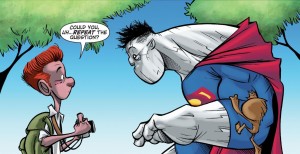
Phil Jimenez
This openly gay half Irish-half Mexican American artist is known for his LGTBQ advocacy as well as his award-winning tenure in the industry. He is loved for his collaborations with Grant Morrison (New X-Men, The Invisibles) as well as his run on Wonder Woman.
Kenneth Rocafort
This Puerto Rican artist has been beautifying and sparking controversy in the pages DC comics with his work on Red Hood and the Outlaws and Teen Titans. His work has been consistently unique and gorgeous since his days on Wolverine/Punisher and Madam Mirage.
Alvaro Lopez
Inkers never get enough love from comic fans, so we decided to mention this prolific Spanish artist who has worked on both Marvel, DC titles. 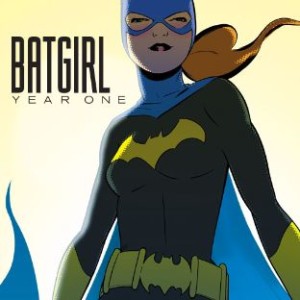
Edgar Delgado
In our interview with Ivan Brandon at NYCC, we commiserated on our inability to name any Hispanic colorists. Luckily, Brandon was able to save the day. This Mexican colorist has worked on Marvel titles including The Amazing Spider-Man and World War Hulks.
George Perez
This legendary Puerto Rican artist defined DC and Marvel comics in the 1970’s and 1980’s in the pages of Teen Titans, Avengers, and Wonder Woman.
Javier Rodriguez
This Spanish illustrator and colorist is best known for his lovely work on Batgirl: Year One and The Amazing Spider-Man and Daredevil.
Quick, push us to compose a pt 4 before Hispanic Heritage Month ends on October 15th! Shout out your favorite Hispanic Artists in the comments below.
Kaitlyn D
Content Editor
@deadrabbit92
Though a novelist at heart, London born author Richard K. Morgan has quite the resume, having taken a dip into different corners of the writing pool. In addition to writing the story for 2011’s Crysis 2 for noted video game publisher, Electronic Arts, Morgan has also gone a few rounds with Marvel’s spy extraordinaire, Natasha Romanoff, and is currently penning a fantasy trilogy starring a gay protagonist, a surprising rarity within the genre. We hopped on the chance to discuss these things as well as his current project, a digital gamebook of his 2008 fantasy series, A Land Fit For Heroes.
Kimi Britt: At what point did you make the decision that being a writer was something you wanted to do for the rest of your life?
Richard Morgan: Well, early enough that I can’t really remember making it! J K Rowling has a nice way of putting it – she said once in interview that ever since she was old enough to understand that there were people who made their living from writing stories, that was what she wanted to be. Same for me.
KB: Were there any specific works or authors who were some of your early inspirations?
RM: I think there was always a pretty even divide between my SF and Fantasy inspirations and then the stuff you could best designate, I guess, as hardboiled. Growing up, I was a huge fan of Michael Moorcock and Poul Anderson, with a side order of Bob Shaw. But at the same age – rather alarmingly – I was also tearing through Ian Fleming’s Bond and Leslie Charteris’s (original, written in the twenties and thirties) Saint books. Then, in the late seventies, just as I was hitting my teens, I came across William Gibson’s early short stories in Omni magazine and – wow! blam! critical mass! Because, of course, what Gibson had done in those stories was synthesise an alloy of exactly those two genre strands I loved so much – hardboiled noir and the finest speculative SF. I knew instantly that this – this! – was the kind of stuff I wanted to write myself.
KB: What rituals or habits did you adopt when you first started writing, and are they still prevalent in your everyday routine?
RM: Truth is I’m not good at ritual, and the way I write – exploratory, improvised, and painfully slow! – doesn’t lend itself to particularly good working practices. What I did in the early years was just dedicate every available hour of downtime I had to writing, whenever I could and wherever I was. And to be honest, that hasn’t changed all that much even now – it’s just that these days, with no day job to distract me, I have a lot more downtime available, so I get more done!
KB: With novels, comic books, and video games in your repertoire, you’re like a triple threat of the literary world. Was there ever a dramatic difference between these genres during the creation process? Are the three vastly different?
RM: Oh fuck yes – game writing and novel writing are about as far apart as it’s possible to get as creative processes. As a novelist, you’re intensely solitary; you sit in your room and type, you sit in your room and type – usually for a year or more, with no – or at best minimal – feedback until you turn in your draft. Game writing is the exact opposite – it’s intensely collaborative, team-based, fast and modular. You spend a lot of time in meetings, going back and forth to ensure you get a good fit with the other components of the game, and you tend to work in chunks – a cut scene script, a character sketch, a set of situational lines – and you get feedback – good and bad! – on those chunks very fast. You send an item out, get it signed off – or not! – and you’re done with it, so on to the next chunk. Also – this is more an attitudinal thing than a process issue – as a novelist, you know that what you’re writing is the whole thing, whereas in game writing, the work you do is essentially just a support framework for the main gig, which is the gameplay. You could write the finest game storyline ever, the best and sharpest in-game lines in the whole wide world, but if what you’ve done doesn’t gel with the rest, or worse still actually gets in the way of the gameplay, then you’ve failed. That’s a suitably humbling thing for a novelist to take on board.
Comicbook writing, I guess, is something of a midpoint between those two extremes – what you’re doing is the main gig, but it’s a main gig you share with the artist; comparing it with game writing, it’s like the difference between being the bass player in a four or five piece band and being the guitarist in one of those guitar and female vocal duos like the Kills or Mazzy Star. There’s a lot more conscious structuring involved than in novel writing – or at least than in the way I write a novel! – but it’s still largely about uninterrupted flow the way novel work is. If writing a novel is jazz, then writing a comicbook is perhaps more like rock and roll or the blues.
KB: Your sci-fi novel, Altered Carbon, is currently being developed for a movie adaptation. As the author of the source material, how much input do you have on that project?
RM: Generally speaking, when you get a movie deal, you take the money, hand the property over, and that’s about it. It’s rare for a novelist to be involved more deeply than that unless they’ve specifically held out for that involvement contractually, and I never have. My feeling is that when you give your book to someone to turn into the a movie, you need to be comfortable about getting out of the way and letting them work. Sure, you could always jump in and ask to learn the whole exciting process of moviemaking along the way, but is the best place to get that work experience really right bang in the middle of some seasoned film professionals’ attempt to turn your novel into a blockbusting movie? That said, the people I’m dealing with in this case – Laeta Kalogridis and Mythology Entertainment – have been really great about keeping me abreast of the process. And the way the contract is structured – this is something that was offered without my asking for it – once the movie is greenlit, I’m invited to come aboard as creative consultant, which should be a lot of fun.
KB: Some book to movie translations leave fans of the original work less than satisfied with the experience. Are you apprehensive about this prospect or does it feel like a natural progression?
RMl Yeah, there’s really nothing much you can do about that. What fans (and writers!) have to understand is that the movie is not the book, and never can be, it has to change in order to work, to live and breathe in such a radically different medium. What you’re aiming to capture is not the thing itself, but the spirit of the thing. And you’ve got to have faith in the people who’ve taken on the work of making that transformation happen (or at least be sanguine about it, if you’ve sold big for what you suspect will be a pretty crappy product :-) ). Like the old James M Cain quote goes – “People tell me, don’t you care what they’ve done to your book? I tell them, they haven’t done anything to my book. It’s right there on the shelf.”
In my case, I have every faith that the people who are working on Altered Carbon really want to honour the spirit of the novel, and however much my control-freak tendencies might pop and sizzle, I just have to let them get on with the job.
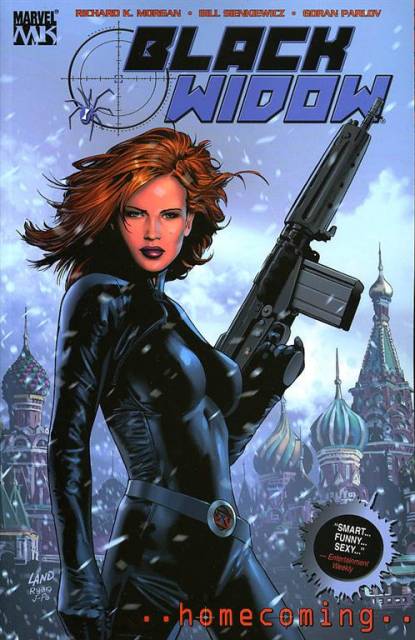 KB: With the influence you had on Black Widow’s characterization and how well the Avengers is doing, do you feel like she is accurately portrayed?
KB: With the influence you had on Black Widow’s characterization and how well the Avengers is doing, do you feel like she is accurately portrayed?
RM: Absolutely not, but what can you expect? I’ve said this before at length to Charlie Jane Anders over at Io9 – the Widow exists as an adjunct of a money-spinning superhero franchise catering to the tastes of 12 to 14 year old boys (and men who’ve somehow managed to grow up and retain a 12 to 14 year old boy heart). As such, she’s the epitome of unthreatening femininity grafted onto a pornstar’s T&A chassis and imbued with a set of plug-and-play boy-hero fisticuff character tics and reflexes. There’s nothing in that for women, nothing much in it even for genuinely grown-up males. The Widow I wrote for Marvel back in the early 2000s was her own woman, older, seasoned, hard as nails and unapologetic about it, centre stage in her own story. And let me tell you, that story flew like a fucking brick – the broad Marvel fanbase hated it. They didn’t like this genuinely empowered (and therefore genuinely feminist) female protagonist, and they voted with their wallets. The arc did disastrously low numbers by Marvel standards. So am I surprised by the version of the Widow that’s now emerged in the movies – hell, no! Just immensely saddened.
KB: Given the chance, would you ever want to return to continue her story?
RM: Are you fucking kidding! I’d love to. Writing Natasha, really letting her breathe, was a total blast! I’d jump at the chance to build a movie around her that did the same things Homecoming did. But there’s no way that’s ever going to happen. Don’t get me wrong, Marvel were great to work for; very professional, very supportive of what I was trying to do, and they really went out on a limb by letting me run with the character for a second arc when the first one had sold so dismally. But in the end, they killed the series for one very simple reason; it was a losing proposition – an expensive auteur project (I mean, we had Bill Sienkiewicz aboard, for Christ’s sake!), and doing dismally downward-spiralling numbers. By contrast, the version of the Widow you see in the movies is pulling in tens of millions of fanboy dollars. I mean, do the math – there’s just no way anyone’s going to let me within a mile of Natasha ever again! :-)
KB: Since you’ve had experience writing for both readers and gamers separately, the idea of bringing your dark fantasy series A Land Fit For Heroes to Steam, iOS, and Android as a gamebook is definitely intriguing to someone who enjoys both. How will a digital gamebook differ from the more traditional “Choose Your Own Adventure” type stories currently available? CYOA stories are typically made for a younger crowd, yet your series offers plenty of mature and controversial themes. Will these remain, and if so, how will they engage the player and the choices they make?
RM: That’s a question I’m not really qualified to answer – I never read the CYOA books back in the day, and I haven’t accessed any of the newer content either (these days I’m so busy I barely have time to read books or play games of any sort, let alone explore whole new formats!)
But my understanding from the brief the guys at Liber Primus have given me is that the vast majority of this stuff is YA-level in content. Land Fit for Heroes is avowedly not – it’s very much an adult fantasy, with adult themes and characters, and it’s as grim as anything I’ve ever written, which is saying something. So there’s that. :-)
 KB: How closely will the gamebook follow the existing story? Do players who have previously read the original have an advantage over newcomers to the series?
KB: How closely will the gamebook follow the existing story? Do players who have previously read the original have an advantage over newcomers to the series?
RM: The story in the gamebooks runs parallel to the main narrative in the novels – there’s some faint crossover with my characters in that some of them will make brief cameo appearances in the gamebook story, but the narrative thread itself follows three entirely new characters, and their adventures are disconnected from the storylines in the trilogy – though what they do and go through will be shown to have influence on the overall turn of events detailed in the novels. What this means for readers who’ve never read my stuff is that they’ll get a different initial angle of entry into my universe; but that won’t disadvantage them in any way as far as the gamebook story is concerned. And of course, if they’re curious about the wider world of the fiction, they can always go off and buy the trilogy after.
KB: What other projects are you currently working on?
RM: I’ve got a new novel up on the blocks at the moment – it’s a return to the universe of my 2007 novel Black Man, but set a good hundred or more years after the events of that story, and on a recently colonised Mars rather than on Earth. It’s called Thin Air and features another genetically modified cast-off protagonist, though a somewhat different and more down-at-heel one than Carl Marsalis in Black Man. I’ve gone right back to the noir wellspring I used in my Takeshi Kovacs books with this one – first person narrative, mean streets, corruption from high to low, a crime no-one wants solved and enemies at every turn. Feels good to be back behind the wheel of one of these!
KB: What sorts of media are you consuming in your spare time and would recommend?
RM: Not a whole lot of spare time to burn right now, I just moved from one end of the country to the other and I’m snowed under with busted deadlines. I am listening to quite a lot of music while I work, though; currently bingeing on 2 Cellos, Health and Cold Specks. And I just discovered an up-and-coming singer song-writer called Isaac Gracie whose single Last Words would make an awesome playout for a movie of my novel Market Forces. I just finished reading Ta-Nehisi Coates’ Between the World and Me, which I’d say is required reading for anyone interested in what’s happening to America at the moment and made me tremble with a father’s rage, and I’m now burning through John Horner Jacobs’ The Incorruptibles which is a superbly fresh-feeling mash-up of fantasy, alternate history and western adventure, the first of a trilogy whose second instalment, Foreign Devils, just came out – I’m running to catch up here! I’ve also been catching up on missed SF movies like Chappie and Ex Machina (both of which I guess I’d recommend seeing but neither of which in the end quite lit my fire) and more noirish fare like Scott Cooper’s Out of the Furnace and Dennis Lehane’s The Drop (both of which are awesome must-see triumphs). Still, sadly, waiting for someone in SF movie making – well, apart from George Miller, that is – to combine the vision and imagination in the former two with the close focus grit and commitment to human realities of the latter. In gaming, I’ve been making do with obsessive replays of The Last of Us, Max Payne 3 and Far Cry until there are enough good games out there to justify the expense of acquiring a next-gen console. At which point, I imagine I’ll be trying Bloodborne.
KB: Finally, where can you be found in various corners of the Internet?
RM: I keep a website at richardkmorgan.com where I try to find time and inspiration to blog at least once a month, and I’m on Twitter as @quellist1. Come on over!
Richard K. Morgan is the acclaimed author of The Dark Defiles, The Cold Commands, The Steel Remains, and Altered Carbon, a New York Times Notable Book that won the Philip K. Dick Award in 2003. A Land Fit For Heroes will be available on Android and ioS, as well as a PC version of the gamebook for Steam in the coming months.
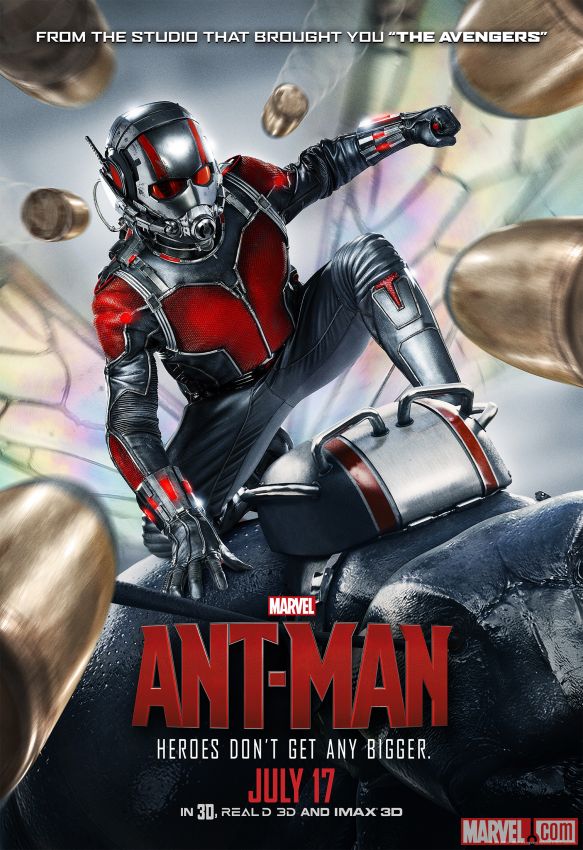 We’ve got a sweet mega-review for Ant-Man, Marvel’s opening act for Phase 3 of it’s Cinematic Universe and the debut adventure for Scott Lang (Paul Rudd) in the Ant-Man costume.
We’ve got a sweet mega-review for Ant-Man, Marvel’s opening act for Phase 3 of it’s Cinematic Universe and the debut adventure for Scott Lang (Paul Rudd) in the Ant-Man costume.
The basic story is that Hank Pym (Michael Douglas), the original Ant-Man, has grown old and has discovered that his former pupil, Darren Cross (Corey Stoll), is very close to replicating his secret shrinking technology. Pym then recruits former criminal Scott Lang, masterfully played by the unaging Paul Rudd, to use the Ant-Man suit to thwart Cross with the help of his estranged daughter, Hope van Dyne (Evangeline Lilly).
Read on to see how four members of the Sub-Cultured team break down the film as well as their feelings on how this stands against previous films in the Marvel Cinematic Universe.
Please enter the url to a YouTube video.
![]() To say I entered Ant-Man with minimal expectations is putting it lightly. I wasn’t quite sure how the whole Hank Pym/Scott Lang story was going to fit in the MCU. Since announcements that Ultron would be Iron Man-created instead of the brain child of Pym, I had been feeling bitter; production issues added to the sour taste in my mouth. Luckily, Marvel has churned out another hit with the charmingly handsome Paul Rudd in the title role. Although the villain is laughably cheesy (seriously, Marvel, write your villains better), and the one female lead is frustratingly sidelined (but there’s Hope for the future), there’s still a lot of really good heart in the film.
To say I entered Ant-Man with minimal expectations is putting it lightly. I wasn’t quite sure how the whole Hank Pym/Scott Lang story was going to fit in the MCU. Since announcements that Ultron would be Iron Man-created instead of the brain child of Pym, I had been feeling bitter; production issues added to the sour taste in my mouth. Luckily, Marvel has churned out another hit with the charmingly handsome Paul Rudd in the title role. Although the villain is laughably cheesy (seriously, Marvel, write your villains better), and the one female lead is frustratingly sidelined (but there’s Hope for the future), there’s still a lot of really good heart in the film.
Toss in a few cameos, and a scene stealing side character, and I was entertained enough to leave the theater grinning. Also, minus the handful of swear words, Ant-Man is definitely friendly for the whole family. But be warned, all viewers may leave with a soft spot for the ants themselves!
Leia Calderon
Editor
@ladyvader99
There were quite a few things I enjoyed about Ant-Man. The biggest feature is the focus on humor, perhaps borrowing a note from Guardians of the Galaxy and moving away from the intensity of Captain America: The Winter Soldier. While I can appreciate the darker nature of Winter Soldier, I don’t believe it would’ve been a good fit for Ant-Man. I am a firm believer that humor is a better way to attract audiences and since we’re so unfamiliar with Scott Lang, it’s a wise approach to get us invested because Lang is so new to viewers.
The second most prominent feature would is been the fight scene with the Falcon. It sort of felt stuck in, but it was used quite effectively when Hydra became involved in the story and of course in the second post credits scene showing how Ant-Man is going to be drawn into Captain America: Civil War. Not only did that fight give Ant-Man an informal introduction to the rest of the Marvel franchise, it was a great demonstration for how powerful the Ant-Man suit is and helped develop another point in the plot: Hydra is coming back.
There were two things that did annoy me in Ant-Man, not that I’d refuse to see it again, but are big enough for me to mention them as problem areas. The first would be that the humor I appreciated so much during the film sometimes made characters into unflattering caricatures. I am talking mostly about the side characters Lang works with for the heist scenes and to a lesser degree Darren Cross as a villain. It’s tough to create minor or opposing characters that aren’t punch lines in some way, but it might have been nice to give them some depth beyond their respective skill sets and roles. The other, which is more pressing, is a huge lack of Hope. Aside from the generic training montage, we don’t actually get to see much of her in action and that’s disappointing. Throughout the movie we are given a first rate education on how she’s so much better at controlling ants and being in charge of the suit than Lang. It’s even a huge part in the dialogue that she’s more qualified in every way to stop Cross than Lang, but the plot and Hank Pym prevent Hope from doing so. Alas all we get is a post credits scene and the vague promise she’ll be in a future film; not even her own film.
![]() I liked Ant-Man. I liked Paul Rudd, especially when he was wearing his hoodie. I think the cinematography was the best part of the movie. I haven’t read any Ant-Man books, but I thought that this fit well into the MCU. I wish that there had been more for Hope to do, or that she had actually been trained after her fight with Hank, instead of just agreeing to train Scott. It felt like a strong attempt for a feminist hero, but ultimately a failed one. I hope that the final scene means that the next movie will be called “Wasp” –but realistically that’s not going to happen.
I liked Ant-Man. I liked Paul Rudd, especially when he was wearing his hoodie. I think the cinematography was the best part of the movie. I haven’t read any Ant-Man books, but I thought that this fit well into the MCU. I wish that there had been more for Hope to do, or that she had actually been trained after her fight with Hank, instead of just agreeing to train Scott. It felt like a strong attempt for a feminist hero, but ultimately a failed one. I hope that the final scene means that the next movie will be called “Wasp” –but realistically that’s not going to happen.
Sam Wilson’s extended cameo was fan-fucking-tastic. The post-end credits scene certainly wasn’t long enough–I miss me some Bucky on the big screen. In conclusion, Bucky.
Jen Schiller
Staff Writer
@jenisaur
![]() While Ant-Man was an enjoyable movie, in my opinion it was the worst Marvel movie to date. Hank Pym was a weaker character and not at all like the Hank Pym from the comics that I know. I would have like to see them push the envelope and show a bit more of his aggression/ego issues. Especially since he isn’t the main character. Darren Cross was incredibly flat as a character, which made him a super one dimensional villain which annoyed me and felt he could have been done significantly better.
While Ant-Man was an enjoyable movie, in my opinion it was the worst Marvel movie to date. Hank Pym was a weaker character and not at all like the Hank Pym from the comics that I know. I would have like to see them push the envelope and show a bit more of his aggression/ego issues. Especially since he isn’t the main character. Darren Cross was incredibly flat as a character, which made him a super one dimensional villain which annoyed me and felt he could have been done significantly better.
Jeremy Harris
Contributor
Images and video courtesy of Marvel.com
Marvel films are an interesting phenomenon I enjoy taking apart and looking at closer. Many people may say “This is fun, this movie is not supposed to be a paragon of progress, it’s a summer blockbuster! Why are you so critical?!” and to that I say “Why not?” We as a nation feed off of the images we are given and I think we deserve great work. I loved Captain America. The original Avengers was fun enough. Winter Soldier is a totally different beast but boasts some of the most solid work Marvel’s done yet. How does Avengers: Age of Ultron fare?
First, it must be said upfront that opinions on Joss Whedon as a writer and as a director right now especially in regards to Black Widow (Scarlett Johansson) are obviously a hot topic and hard to avoid. I have my opinions. I’ve seen a bulk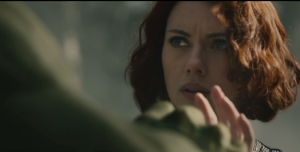 of his body of work. Binge watching Dollhouse does things to you. And yes, Age of Ultron definitely fits into his established canon style, along with all the associated pluses and minuses therein. Yes he can do good stylish action and funny banter. He can write nuanced women. But he is also a longstanding problematic writer too, documented, often in cases regarding those same women. He is both simultaneously. Is he responsible for all of Marvel’s shortcomings regarding Natasha? Well not all, some are systemic to Marvel Studios in general as revealed by Wikileaks and the Sony hacks, and their personal choices and stances, but that doesn’t wash his hands clean either considering he was both writer and director (I’m well aware he and Marvel fought over certain scenes, especially the farm scenes and Thor’s prophetic water-dip) on this film.
of his body of work. Binge watching Dollhouse does things to you. And yes, Age of Ultron definitely fits into his established canon style, along with all the associated pluses and minuses therein. Yes he can do good stylish action and funny banter. He can write nuanced women. But he is also a longstanding problematic writer too, documented, often in cases regarding those same women. He is both simultaneously. Is he responsible for all of Marvel’s shortcomings regarding Natasha? Well not all, some are systemic to Marvel Studios in general as revealed by Wikileaks and the Sony hacks, and their personal choices and stances, but that doesn’t wash his hands clean either considering he was both writer and director (I’m well aware he and Marvel fought over certain scenes, especially the farm scenes and Thor’s prophetic water-dip) on this film.
So yes, hold him and the studio (and merch companies) accountable for things. Open up discussion. As for Black Widow I have read up on the arguments for both sides regarding her treatment and can interpret the film both ways. Both Bruce Banner and Black Widow aspiring for normalcy of some kind (more-so the choice to have it or not) when it is nearly impossible for them due to their own individual circumstances is a very valid plot thread. For Natasha it’s clear that her being a hero, being heroic, is atonement. She’s like a Lady Macbeth, a person who can never get her hands clean of the blood from her past in her own mind (meanwhile for others the water has already has run clean) and so she continues to do right in the chance it may wash off for herself. Did they convey this the best way they could have? Probably not. Was “I’m a monster” awkward and open to be misunderstood if it wasn’t about her inability to have children naturally and was instead intended as a blanket phrase regarding her past? Very. Would Joss have benefited from a co-writer? Yes. Did I like the romance? Sort of? Does Black Widow need her own film and should have had one by now? Yes. And that’s where I’ll end that.
As for the rest of the film itself; how well does Avengers Age of Ultron stand structurally as a film?
Fun at times, but flawed from an editing and directing standpoint. It hits a lot of sweet spots for what you’d want from a summer action film and its plentiful Marvel Easter eggs kept people, even myself, wriggling a little in seats. In that sense it’s not a dud. The film crackles with a degree of energy and puckishness, which, juxtaposed with the superhero-brand violence and physics continues a distinct calling card tonally for the Avengers and by extension the 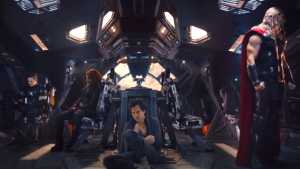 MCU franchise. Said tone was a bit all over the place here, but if properly balanced as it has been in other films, it will be useful in differentiating Marvel’s films from DC’s forthcoming grey and rain-drenched cinematic world which I believe will have much less room for “fun”.
MCU franchise. Said tone was a bit all over the place here, but if properly balanced as it has been in other films, it will be useful in differentiating Marvel’s films from DC’s forthcoming grey and rain-drenched cinematic world which I believe will have much less room for “fun”.
Avengers Age of Ultron‘s opening in particular was a fun, verging on camp romp with it’s over the top action and choreography. The Hulk take-down was properly bonkers. But, ultimately after leaving the movie I found myself perplexed regarding if I really liked the film as a whole.
Distilled down into moments it was certainly entertaining. Most of anything Pietro (Aaron Taylor-Johnsohn) did made me laugh. The Mjolnir fly-by ponder and grab? Funny. Hulk Buster satellite and gear named Veronica (oh poor put-on-a-bus Betty Ross)? Perfect. Ultron targeting Thor because he’s a powerhouse and “annoying”? Gold. Ultron himself? I’m split. When looked at as a larger piece it is not as seamless as the other films as pacing is somewhat…off. The last quarter of the film in particular suffered a sense of discord all over. To hear that there is likely nearly an hour or more worth of scenes on the cutting room floor is not surprising; it felt like it. Additionally, at least in my full theater, there were scenes that were meant to be serious or dynamic but instead the audience laughed, clues to perhaps some misguided writing or directing (or maybe even a bit of both).
It’s not life changing cinema. It’s dynamic, it’s popcorn munching, but Avengers Age of Ultron ultimately got lost in itself.
Rating: C
However, it has a lot of good thematic nuggets in there. Perhaps a “director’s cut” version of the film could remedy a lot of the pacing and meat-y bits that I’m missing.
How could it have improved? Here are 5 tweaks and suggestions that could have made the film even greater.
1. Have a Black Panther Cameo
You have Hulk wreck havoc in Africa in proximity to what we can assume is near Wakanda (but is not in fact Wakanda). Damage is equivalent to a major terrorist attack if not more. A brief video of T’Challa appearing on a screen post Hulk-bust having a news conference angrily berating The Avengers and Tony Stark for leaving so soon and handing everything off (not knowing of the Ultron situation) would have been a nice surprise and also set up any possible tensions that could later blossom during his official “cape” debut.
2. More “Hulk-bust” fall-out // Up Ultron’s Scare Factor.
Spinning off of the above, a more visible global response to the Hulk and Iron-Man battle with faux news (har har har) reports, etc would have been good. More tangible backlash against them as a group might have been interesting as they tr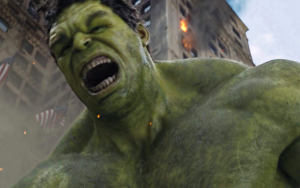 y to hide from Ultron which could be a good foundation for the Civil War atmosphere. Ultron doing his part by further manipulating the media and people to turn against them would have been compelling.
y to hide from Ultron which could be a good foundation for the Civil War atmosphere. Ultron doing his part by further manipulating the media and people to turn against them would have been compelling.
Ultron in general was surprisingly limited and small scale considering he was literally able to infiltrate the internet. He didn’t mess things up enough. While his giant rock pummeling into the earth causing mass extinction is insidious and mega-bad, he felt a lot smaller of a threat than the alien hoard flying out of a portal in the sky or an entire secret government task force being revealed as corrupt Neo-Nazis with killer big brother satellite intentions. Once the rock started to fly, yes that’s scary, but there wasn’t any other sense of pomp or chaos. Ultron’s constant quipping, which made great use of James Spader wasn’t given enough of an outlet. There are hints of Frankenstein’s monster and of course, Pinocchio in his desire to get a new body, to be “real”, but the torment of the former eloquent but murderous literary figure who is alone and aware of his unnatural-ness and alone-ness isn’t fully realized. We get a shade of that, when he tells Natasha he’s lonely, but it’s never quite fully explored from there outside of Vision confronting the last Ultron-bot.
3. More Ladies, More Representation
The lampshade joke regarding the lack of women and way too many men at Tony Stark’s party as quipped by Maria Hill in my theater was met with half laughter and half groans. It comes off as “Oh hey we know it’s really bad demographics wise, see we’re self aware!” and think that’s enough to skid by. It would be different had they had then solved that problem later in the film and perhaps revisited the comment to essentially render it moot.
It’s bad enough Betty Ross was seemingly wiped from Hulk’s canon. I know Hulk is not as popular (I certainly haven’t seen his film) but the glaring omission of her character as an established love interest and a connection to Bruce as someone emotionally invested is a lost opportunity on multiple levels considering her role in the comics. Small cameos from Pepper Pots (Gwyneth Paltrow) and or Jane Foster (Natalie Portman) would have been appreciated as their absences were unnatural given the circumstances (no angry video calls from Pepper?) and further lamp-shaded with awkward banter from their respective boyfriends.
While Agents of Shield features the first leading and supporting Asian women in the MCU universe, Melinda May (Ming-Na Wen) and Skye (Chloe Bennet), Helen Cho marks the first entry of an Asian supporting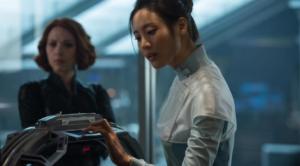 lead in the films. She’s pretty important. Not only does she bear the name of Amadeus Cho’s mom from the comics, but she’s also instrumental (albeit while brainwashed)
lead in the films. She’s pretty important. Not only does she bear the name of Amadeus Cho’s mom from the comics, but she’s also instrumental (albeit while brainwashed) in the creation of Vision ( (Paul Bettany). However, I wish she had been given a few more scenes. I also wish, and this is entirely self-serving, that she was the MCU’s Wasp, following the “Ultimate” universe version, adding two possible women of color to the roster of Avengers caped main players in this film (Wanda and Helen).
The problem with Helen Cho in Age of Ultron is that she just…vanishes. The last we see of her is after she was throttled for sabotaging things post-mind control. The Avengers come to her aid, she tells them where to go, and she is just gone from thereon out. Helen is, from what I can recall, not shown again until the end, when all is well and she’s working at the new Avengers headquarters. One of the people I went with, in which our screening was her second viewing, was flabbergasted after noticing Cho at the end and realized she had actually survived the film; she thought she died the first time she saw it. Where did she go from there? She helped create Vision. She’s just like Tony Stark in that she had a hand in creating an entity unique to itself.How did she feel about that? It’s a Dr. Frankenstein moment fueled by Thor thunder. Shouldn’t that have been explored more?
4. Make the small stone church featured a small synagogue.
Marvel has gotten a lot of flack for not casting a Jewish, Roma, or Jewish-Roma actress for Scarlet Witch (Elizabeth Olsen) nor making mention of the twins ethnoreligious backgrounds in the movie. Since Quicksilver’s actor Aaron 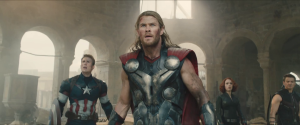 Taylor-Johnsohn is Jewish (many reviewers are scathingly erasing this fact and calling him gentile) an easy fix aside from actually casting an Eastern European Jewish, Roma, or Jewish-Roma actress for Wanda, they could have, at the least, made the church featured in Age of Ultron to be an old small synagogue instead. A simple comment from one of the twins while inside the building for the first time could then infer their backgrounds. It would have been an easy swap and a subtle way to add diversity to the roster even without access to Magneto.
Taylor-Johnsohn is Jewish (many reviewers are scathingly erasing this fact and calling him gentile) an easy fix aside from actually casting an Eastern European Jewish, Roma, or Jewish-Roma actress for Wanda, they could have, at the least, made the church featured in Age of Ultron to be an old small synagogue instead. A simple comment from one of the twins while inside the building for the first time could then infer their backgrounds. It would have been an easy swap and a subtle way to add diversity to the roster even without access to Magneto.
5. Give the big finale (hey, how about the whole movie) to Scarlet Witch
Ultron states he has no strings to hold him down, but the real plot of the film are the strings that bind the Maximoff twins becoming undone. I think they should have opened AoU showing Wanda and Pietro’s experience in the war in their country and seeing STARK on the weapons. Then cut to the Avengers’ siege on the stronghold during the current day as they had it.
Tony also shouldn’t have been the one to deliver the final blow to the giant rock/city. Sure they gave Scarlet Witch the big “heart” ripping out scene, but the film would have reached a pretty iconic moment had they given her the 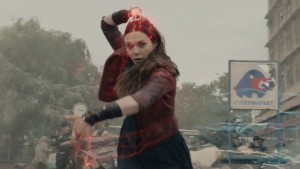 ending entirely. They did a mini-outburst showing what she can do powers-wise when upset, but that wasn’t enough.
ending entirely. They did a mini-outburst showing what she can do powers-wise when upset, but that wasn’t enough.
Scarlet Witch is supposed to be powerful. Very. Powerful. Imagine, Tony’s beam fails and all seems lost, but then Wanda, in a fit of rage and emotion (in response to what occurs towards the end) finally shows the extent of her abilities and wanting so bad to find justice, engulfs the entire city with her powers. She then literally STOPS the city from impact and sets it down back to where it was, or crumbles and tears it apart herself. Given Ultron’s Pinocchio obsession, the theme of puppets is also fitting for Wanda. She had been used as a puppet for so long first by Hydra as a guinea pig and then by Ultron and for her to have a “There are no strings on me” moment would have been such a great counter to Ultron’s own assertions of the line (which are in my opinion a false one, as he is following Tony’s zealous but flawed programming thus indeed has a string), since Wanda would in comparison truly have been string-free at that point, and then saves the city by controlling it herself, the way a puppeteer controls a marionette; the puppet becomes the puppeteer.
Final Verdict
The film is an ambitious one and juggles a lot of characters so it’s not surprising things got pushed to the side and it got disorganized and tripped over itself in the process. However, it sets up some good things; the new Avengers roster consisting of Black Widow, Scarlet Witch, War Machine (Don Cheadle), Falcon (Anthony Mackie), Captain America (Chris Evans) and the cyborg Vision is more diverse than the prior team.I think ultimately the best thing about Age of Ultron is the discussion it’s causing. Its making people talk, and talk a lot. Our pop-culture won’t change otherwise. I think that in itself is pretty…super. Talk with us. What did you think?
Max Eber
Staff Writer
@maxlikescomics
4% Match | 96% Enemy
Mad_Titan_96
Immortal, Male, Roaming the Galaxies
My Self-Summary:
Am I not Thanos?! Did I not butcher the woman who gave me birth, who force-fed me into this hell called life?! Is not the wake of my passing crimson with the blood of my enemies and allies alike?!
Nah, really, I am just your typical Mad Titan and God of Death. I’m really a nice guy. I’m into a lot of stuff, politics, alternative religion, rock collecting. Yeah, I’ve got some family issues and I’ve been told I have an anger problem, but I don’t think I’m much worse than anyone else, you know?
What I’m Doing With My Life:
I’m really into trying to gain all mighty, unstoppable power, reality altering, you know how it goes. I’ve also been getting into MMA training.
I’m Really Good At:
Being an AWESOME boyfriend. That’s not bragging, I am the sort of guy who would do anything for the girl I love. I mean ANYTHING. I just really wish I could find the sort of girl who could appreciate that fact. I mean, the kind who can appreciate it and ALSO can survive in deep space.
The First Thing People Usually Notice About Me:
Probably that I’m really tall. Or that I’m trying to slaughter them. But the height thing probably stands out more lol.
Favorite books, movies, shows, music and food:
Fight Club is my favorite book and movie. As for music, I’m really into My Chemical Romance, but only Black Parade and their early stuff, after BP they totally sold out. But really, I’m willing to listen to or watch anything that makes my girl happy. It is all about giving her what she wants.
The Six Things I Could Never Do Without:
The six infinity gems. Except I’ve done without them for awhile, so, I guess that’s not true.
I Spend A Lot Of Time Thinking About:
Death is with me every second of the day! My every moment is spent in either dealing out death or worshiping it! And you’d think she’d appreciate that, right? I mean, you end the lives of half the population of the universe, you reorder the planets, you build her a throne and offer her whatever she wants and that BITCH puts you in the FRIENDZONE. Can you believe it? I went out, spent all my time getting just the right jewelry, and it turns out the whole time she was just leading me on, all “Oh, I’m going to resurrect you and order you to kill people,” and when I do that I don’t even so much as get a kiss on the cheek? I mean, you think she’d be impressed with this art project I worked on with this girl I know, Nebula? But Death WOULDN’T EVEN SPEAK TO ME.
What the hell is WRONG with bitches like her, huh?
The Most Private Thing I’m Willing To Admit:
I worked as a farmer for awhile and it was actually pretty sweet.
You Should Message Me If:
You’re Death.
No, really, you’re Death and you don’t wanna play with my heart anymore.
STILL YOU WILL NOT SPEAK TO ME? I AM THANOS!


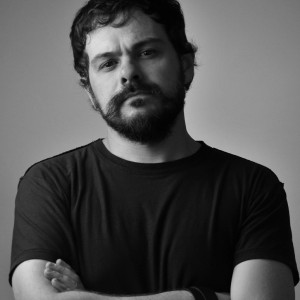
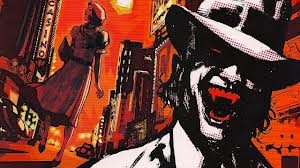
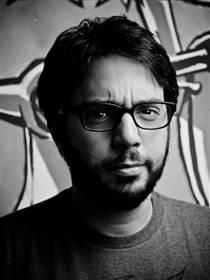
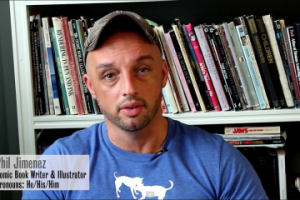
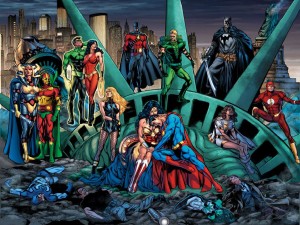
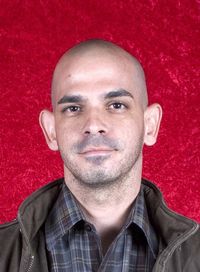
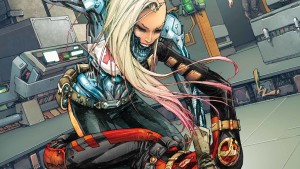
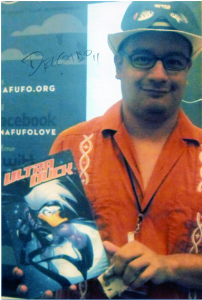
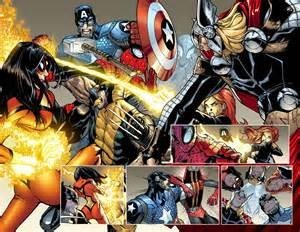
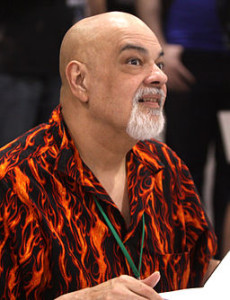
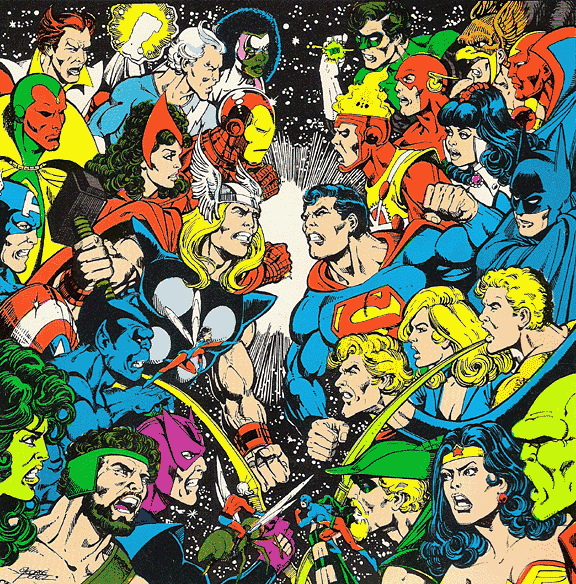
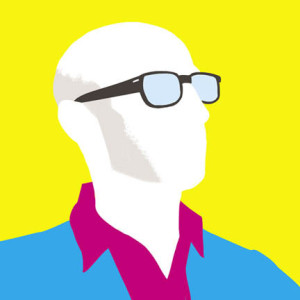
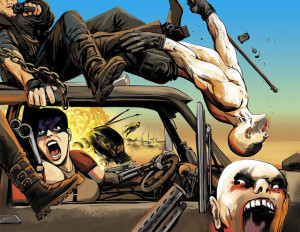
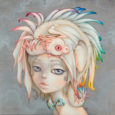
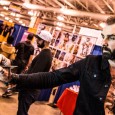
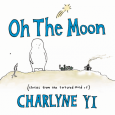
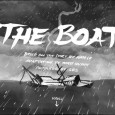
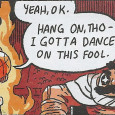
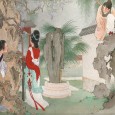

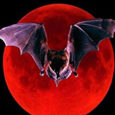
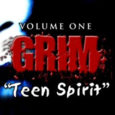
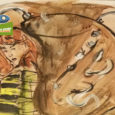
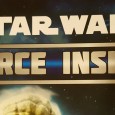
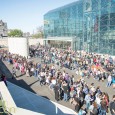
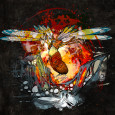
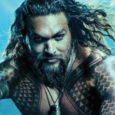

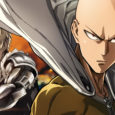

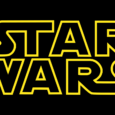
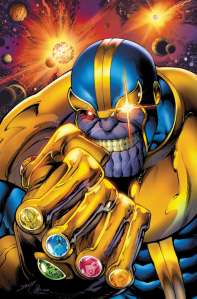
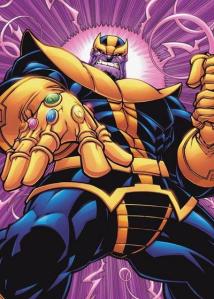
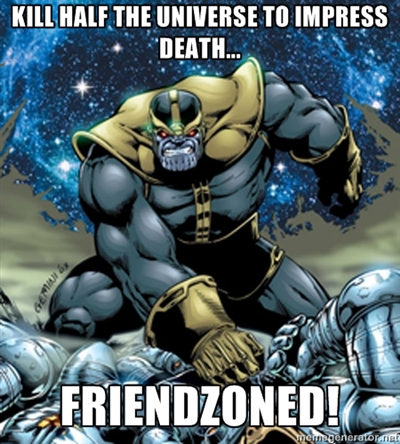
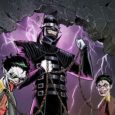
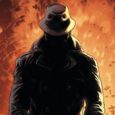
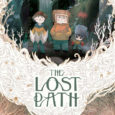
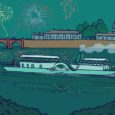
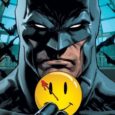
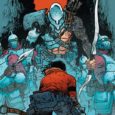




A-Force #1 hits shelves May 20th
Dr. Lepore,
Allow me to preface this letter by saying your accolades and background are far and above my own, as I am but a woman in the comics industry, in particular a woman who manages a comic book store. I’ve carried your book, “The Secret History of Wonder Woman,” in my shop to great success, and I was interested to read your thoughts on A-Force, a comic that has my female customers absolutely excited to pick up.
I’ve never been so disappointed.
Aside from the glaring lack of research and absence of any actual insight from professionals in the industry, there are problems with your article that could have been solved with a simple Google search. For example, you state, “The A-Force is a race of lady Avengers, led by She-Hulk, who come from a “feminist paradise,” but I don’t know what that could possibly mean, because they all look like porn stars.” This isn’t the first time a hero like She-Hulk has come under fire for her appearance, and it certainly won’t be the last, but this is a problematic sentence. Without researching a little about She-Hulk, and learning she is in fact one of the most feminist heroes we geeks have, you reduce her (and based on your sentence structure, everyone else on the team) to a porn star, like they can’t be feminists or heroes.
Later, you liken the costume of the complex, three dimensional character of Pepper Potts to a shirt one would borrow off a boyfriend, even if that boyfriend is genius, billionaire, playboy, philanthropist Tony Stark, just because you can see the outline of her breasts. I wish that were the end to the disservice, but you then go on to claim Nico Minoru, a sorceress once considered for the Sorcerer Supreme, is lame, perhaps due to her fashion choices, and that Thor and Loki, just became women, when in fact Norse mythology is remarkably genderfluid. Is any of this apparent based on a first issue of a new series that is packed characters who, combined, have been in print for over 100 years? No. But what costume design or breast size would communicate any of that to a new reader or 4th grade boys?
Perhaps you were concerned with how much of female superheroes are drawn for the male gaze, which is a completely valid concern. Let’s talk about how to fix that. How do we reclaim She-Hulk from the fantasies of teenage boys, if that’s all a grown woman like yourself sees when she opens A-Force? I pictured She-Hulk as she is and turned an imaginary boob-dial in my head to reduce her cup-size… and my stomach churned. It felt like body-shaming a powerful character that I adore, and would adore no less if she had a different figure than the one she’s had for almost 25 years. I understand your superficial criticism, but not your implied solution.
There are definitely still strides to be made by Marvel in both its cinematic universe and comics themselves, in character costume and characterization, but the writers in mention, Joss Whedon and G. Willow Wilson, are doing something greater than “re-inventing” the female superhero. They are attempting to diversify the people we see as super heroes in our media. G. Willow Wilson, writer & co-creater of the latest Ms. Marvel, Kamala Khan, is responsible for a groundbreaking series that has been consistently breaking print and digital run records featuring a minority: a Muslim teenager. This series in particular marks the first time I’ve seen girls and women of a Muslim background even come into my shop, PURELY BECAUSE they can see themselves in Kamala. Let’s say the mother of one of these girls reads The New Yorker and sees the heroes Kamala is fighting alongside likened to porn stars. Do you see how this could be detrimental to something so good? Again, you harp on She-Hulk for not being an example of a “better female character” when Jennifer Walters is single-handedly a demonstration of “what women might be if they were freed from fears of judgment and the threat of physical danger.” She is an accomplished lawyer, a respected member of the Avengers, and secure in her appearance without having to sacrifice her sexuality, so tell me…how is she not one of the best female characters we have?
A-Force is marketed as a team of able superheroes of all ages, shapes, and sizes, and is something to be lauded, not ridiculed because they happen to have breasts. Do they not have identities? Do they not matter because their superhero moniker doesn’t have “-man” tacked on at the end? Sure, I’ll be the first one to agree that I wish their armor/costumes weren’t plastered to their perky boobs all the time, because the point that that is what Captain Comics and Mr. What took away from the issue at the breakfast table shouldn’t be ignored. Granted, pre-teen boys aren’t the biggest demographic purchasing comics in this modern age, but at least here I can agree that it’s unfortunate that their view of what women can be as superheroes is clouded by their cleavage size.
I had hoped there’d be some more mention of the plot, as America Chavez has also recently come onto the comic scene (and another girl of color, no less), and become a fan favorite, but it looks like your unfamiliarity with everyone minimized what was taken in, story wise. I urge you to judge our female characters less harshly in the future because the industry has come a long way since the creation of Wonder Woman, and I suggest you pick up a couple of books and become a fan through their stories, and not dismiss them for the skin they show. Most shops will have softcover copies of Ms. Marvel: No Normal or She Hulk: Law and Disorder, or hell, you can always tweet at the vast network of female comic retailers (@LCSValkyries), or myself, and we’ll all be glad to give you recommendations to broaden your appreciation of the modern female superhero.
Lastly, Jessica Rabbit’s iconic line is symbolic of the prejudice she is subject to based on her sexualized appearance. It’s ironic you use it in your article as a closing statement, where you’ve done the same to the cast of A-Force.
Sincerely,
Leia Calderon
REVIEW | The Batman Who Laughs – #1
REVIEW | Doomsday Clock #4
Review | The Lost Path by Amélie Fléchais
Emerald City Conversation with Jen Wang
REVIEW | Doomsday Clock #2
Top 10 Comics of 2017